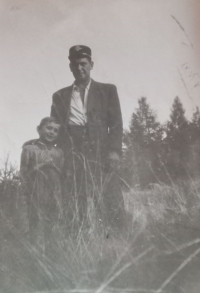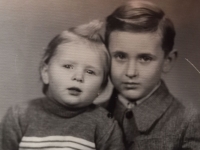We’ve been here as if we were cursed

Download image
Milada Tahotná was born on 3 February 1949 as the second child of train conductor Josef Kozel and Anna Kozlova (née Šimčíková). The family lived in Hořovice near Beroun. In 1949, Josef Kozel was seriously injured while serving on the railway and became fifty percent disabled. He was then transferred from Hořovice to the remote Sudeten village of Polná in Šumava, where he worked as a conductor from 1949 until the early 1970s. Milada Tahotná describes the family’s life in the village, where none of the original German inhabitants remained after the war and which was gradually inhabited by Romanian Slovaks, members of the CSLA and people who came there from various parts of the country in search of work and accommodation. She describes the gradual transformation of Polná in the Bohemian Forest to meet the needs of the Boletice Military District, of which the village became a part in 1950. In 1964 she was accepted to the ceramics apprenticeship at the Secondary Industrial School of Ceramics in Bechyně, but she did not enrol. The management of the ONV in Český Krumlov feared that she would not return to the Český Krumlov district and that the border region would lose its workforce. She was hastily accepted at the engineering apprenticeship in Velešín, from where she left almost immediately after her apprenticeship and joined the ČSD. In 1967 she married Jan Tahotný, a soldier in the CSLA. She experienced the arrival of Warsaw Pact troops in Polná in August 1968. In response to the August occupation, Jan Tahotný was expelled from the Communist Party of Czechoslovakia and shortly afterwards left the CSLA. Thereafter, with little prospect of career advancement, he worked as a civilian employee for the Military Construction Company. Jan Tahotný’s disagreement with the events of August 1968 also affected the lives of Milada Tahotná and their son Petr. In 1976 they moved to Horní Planá, a village bordered on one side by the Boletice Military Area and on the other by the border zone. In 2024, Milada Tahotná lived in Horní Planá with her husband Jan.

















